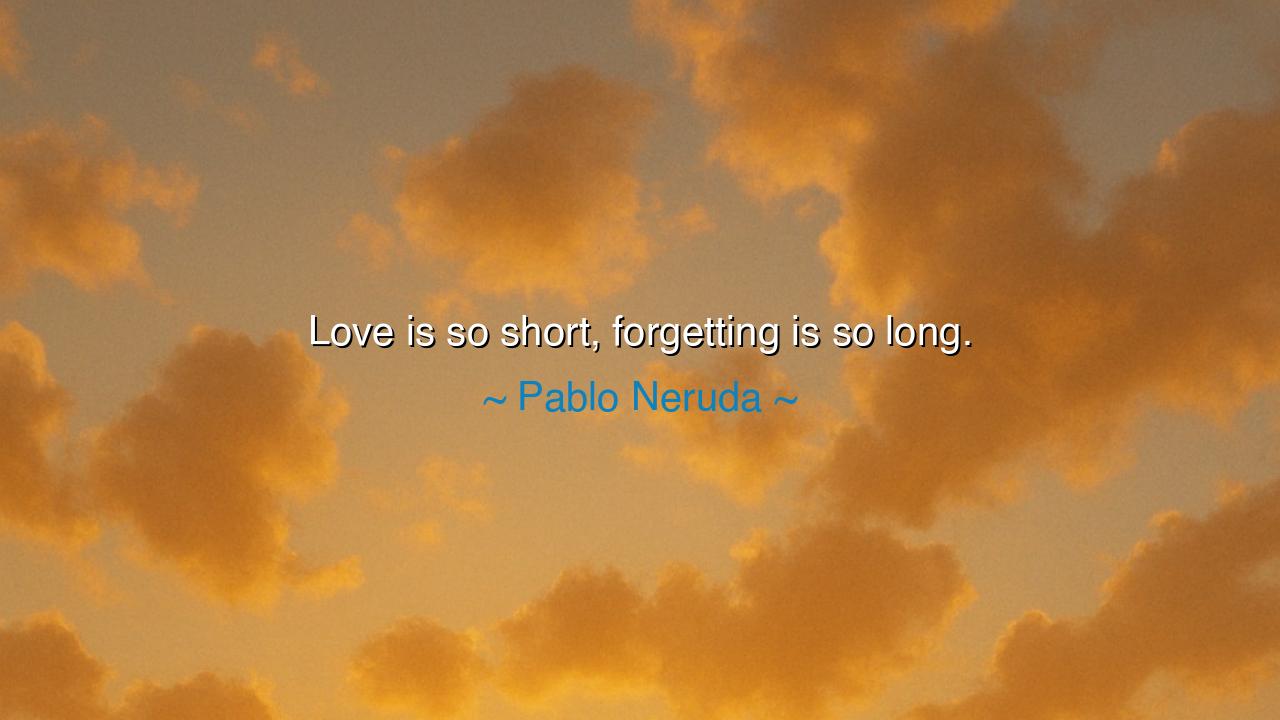
Love is so short, forgetting is so long.






Hear now the immortal lament of Pablo Neruda, the poet of passion and loss, who once wrote: “Love is so short, forgetting is so long.” In these few words lies an ocean of human truth — a truth that speaks to every heart that has loved and lost. For love, though it burns brightly, often flickers swiftly, leaving behind the long shadow of memory that refuses to fade. The flame of affection may last but a moment in the measure of eternity, yet its warmth — or its absence — lingers like an echo that time cannot silence. In this paradox of brevity and endurance, Neruda captures the essence of our mortal hearts: that joy is fleeting, but sorrow, like the tide, returns again and again.
This line was born from Neruda’s poem “Tonight I Can Write the Saddest Lines,” written in his youth, when love’s sweetness was still sharp enough to wound. It is the cry of a man standing between remembrance and forgetting, torn between the beauty of what was and the emptiness of what remains. For love, he tells us, is the greatest of gifts — but also the cruelest of teachers. It shows us the heights of joy only to remind us of how far we can fall. When it departs, it leaves behind a silence that no words can fill. In that silence, the heart begins the long labor of forgetting, yet even that is never complete. For the mind may move on, but the soul remembers.
The ancients understood this sorrow well. Orpheus, the great musician of Greek legend, descended into the underworld to reclaim his beloved Eurydice. For his love was so great that even death could not silence it. Yet in his longing, he turned too soon, and she vanished forever. His love was brief — her hand within his for only a heartbeat — yet his mourning lasted a lifetime. Thus, even in myth, we see Neruda’s truth: that love is short, but the memory of love — its ache, its echo, its ghost — endures far longer than the love itself.
This is the nature of the human heart. We are creatures who live for moments — for the touch, the glance, the whisper that reminds us we are alive — yet those same moments carve themselves into us. Time may heal the wound, but the scar remains. The laughter shared with one who is gone, the scent of a place once shared, the sound of a name — these linger like ghosts in the corridors of memory. The poet’s grief is the grief of all mankind: to love deeply is to risk eternity with the pain of remembrance. The more profound the love, the longer its echo within us.
Yet there is beauty in this sorrow. For to remember is also to honor. The longness of forgetting is not a curse, but a testament to how powerfully love shapes the soul. When we cannot forget, it is because the one we loved has become part of us — woven into the tapestry of who we are. Even when love is gone, its lessons remain: tenderness, compassion, and the capacity to feel. In this way, the pain of memory transforms into wisdom. The heart, though broken, becomes deeper, more human, more capable of understanding others’ pain. Thus, even the longest forgetting has a purpose — it teaches us the endurance of the spirit.
Consider, too, Queen Victoria, who, after the death of her beloved Albert, wore mourning black for forty years. Her love was cut short by death, yet her sorrow became the story of an age. Through her grief, she showed a world accustomed to power that vulnerability is not weakness. She could not forget — and in that inability lay the greatness of her heart. She embodied Neruda’s truth: that love, though fleeting, leaves behind an eternity of remembrance.
So let this be your teaching, O listener of the heart: Cherish love while it lives, for it is brief and precious. Do not withhold your affection, thinking time is endless, for it is not. When love departs, grieve — but do not curse the length of your remembering. Let it teach you patience, humility, and depth. For to love, to lose, and to remember is the full measure of being human. Forgetting may be long, but it is through remembrance that we grow wise and compassionate.
For truly, as Pablo Neruda wrote, “Love is so short, forgetting is so long.” These words remind us that though love may pass, its light never wholly dies. It lingers in memory, in the lessons it leaves behind, and in the tenderness it awakens in us. So love bravely, even knowing it may end. For the pain of remembrance is but the proof that love was real — and in that truth, both sorrow and beauty find their eternal home.






AAdministratorAdministrator
Welcome, honored guests. Please leave a comment, we will respond soon